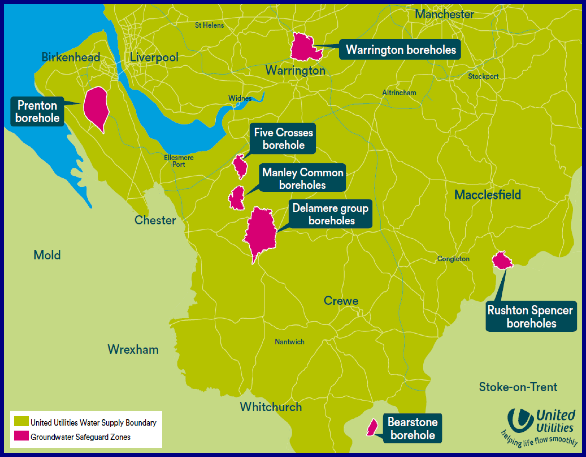United Utilities
United Utilities – Working with the community to keep Cheshire's catchments clean
At United Utilities we're proud to work with people living in the Sandstone Ridge area of Cheshire to keep the county's catchment waters clean.
As well as helping the environment, our catchment work also benefits our customers by improving water quality and reducing the level of treatment we need to carry out at our water treatment works. This reduces the need for investment at our treatment works which in turn helps to keep customer bills low.
We abstract water from boreholes in and around Cheshire and these form an integral part of the local drinking water supply. Located close to Sandstone Ridge are three of our Cheshire groundwater catchments – Manley Common, Delamere Group and Five Crosses each of which have one or more boreholes.

The porous sandstone in the area forms one of the most important aquifers in the country. But while it creates ideal conditions for water storage the sandstone also provides a pathway for pollutants from the soil surface to reach the groundwater.
We've noticed that groundwater nitrate levels have risen over the last 15 to 30 years at a number of the boreholes. There are many potential sources of this nitrate including agricultural and equine fertilisers and manures, atmospheric inputs in rain and dust, golf course maintenance, road run off and potential sewage inputs from leaking sewers and septic tanks.
That's why we work closely with farmers, anglers, gardeners, householders and smallholders to see what can be done to reduce nitrate levels and raise awareness of how pesticides and nutrients getting into our rivers and into groundwater can lead to increased costs and difficulties in drinking water treatment.
As part of this work, we've joined forces with Reaseheath College to employ a catchment advisor to work closely with local farmers, landowners and land users living and working on the catchment land. The advisor provides practical advice and financial support and runs water monitoring programmes to see which of the interventions are the most effective at reducing nitrate levels. They manage community events, workshops, community meetings, farmers meetings, students and other local stakeholder groups and provide practical assistance that delivers water quality and biodiversity improvements.
They also give farmers the chance to have their fertiliser and muck spreaders calibrated for free to ensure accurate spreading in terms of both rate and evenness of spread.
Other assistance includes free soil testing and nutrient management planning designed to help farmers gain maximum efficiency for their money.
The advisor has access to the Environment Agency's computer management tool which can analyse the amount of nitrogen that farmers are losing which could be benefitting their next crop. It calculates how much nitrogen is lost from the soil based on over-winter management, underlying soil type and rainfall data. As part of this analysis, the catchment advisor can provide an up to date nutrient management plan and suggestions on ways to reduce losses.
Recently, we ran an innovative scheme to encourage farmers to grow a cover crop over winter to reduce nitrate leaching into the groundwater during heavy rain.
Farmers, who farm land over important water storage aquifers in the Cheshire area, were given the opportunity to bid for the cost of cover crops in a reverse auction run by United Utilities in conjunction with EnTrade, an online platform that facilitates environmental improvements.
Around 12 per cent of eligible farmers took part in the auction and successfully bid to save a total of 7,500 kilograms of nitrogen.
To check all the initiatives are working, eight sets of porous pot samplers have been installed across the county to monitor how much nitrate is lost in water leaching from the soil over winter.
Dr Kate Snow, United Utilities' water catchment manager, said: "Our catchment work in Cheshire has three main goals – to raise awareness of issues affecting drinking water quality, to run enhanced water monitoring programmes and to offer support and advice to landowners and users in the catchments, encouraging, promoting and assisting with cost effective best practice."

Sandstone Ridge Trust
Registered Company No. 7673603
Registered Charity No. 1144470
info@sandstoneridge.org.uk
